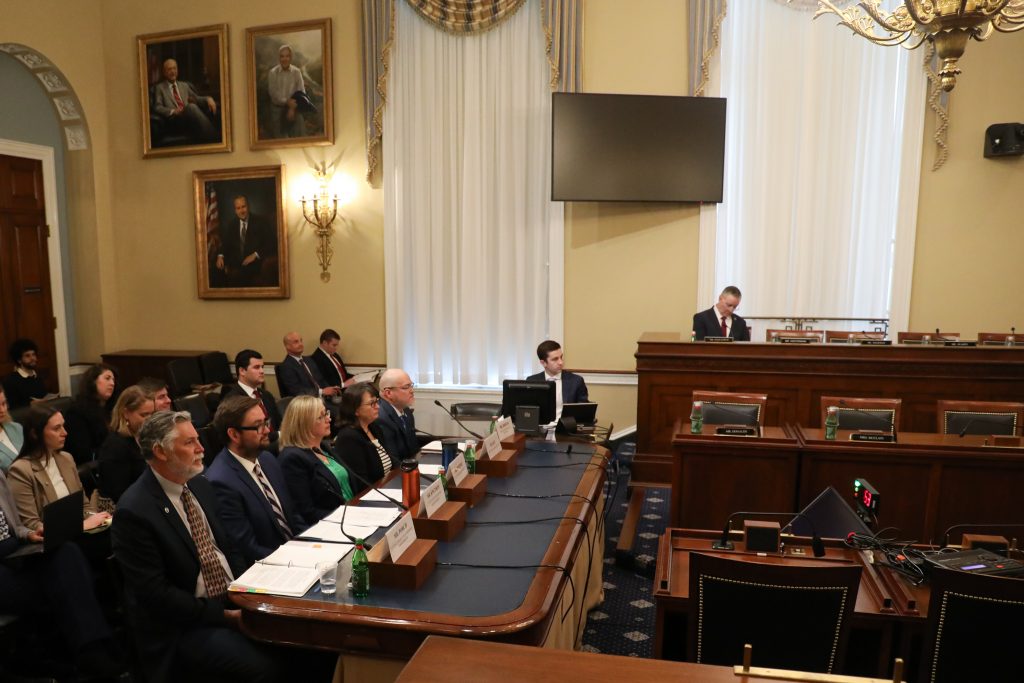Why It Matters: Offshore fishing in the Gulf of Mexico from Alabama to Texas is often best around offshore oil and gas platforms and associated infrastructure on the outer continental shelf (OCS). These hard structures that dot the Gulf provide valuable habitat for fish, corals, and invertebrates and important fishing destinations for anglers and commercial fishermen alike. Unfortunately, many have been removed through decommissioning, but the Marine Fisheries Habitat Protection Act would facilitate the conversion of the most important and prolific marine habitats on standing OCS platforms to permanent artificial reefs under the Rigs to Reefs program.
Highlights:
- On Thursday, March 21, Chris Horton, Senior Director, Fisheries Policy for the Congressional Sportsmen’s Foundation (CSF) testified before the House Natural Resources Subcommittee on Water, Wildlife, and Fisheries on the Marine Fisheries Habitat Protection Act (H.R. 6814).
- H.R. 6814 was introduced by Congressional Sportsmen’s Caucus (CSC) Vice-Chair Representative Garret Graves and former CSC Co-Chair Representative Marc Veasey in December 2023 and seeks to facilitate the conversion of offshore oil and gas infrastructure to permanent artificial reefs.
- Since the late 1940’s, nearly 7,000 offshore oil and gas platforms were installed in the Gulf of Mexico, providing otherwise scarce hard substrates that become the catalyst for thriving marine ecosystems and important fishing and diving destinations.
- Unfortunately, only about 1,100 remain, many of which are nearing or have reached the end of their production life and will have to be removed if not converted to artificial reefs through the Rigs to Reefs program.
On March 21, the House Natural Resources Subcommittee on Water, Wildlife, and Fisheries held a hearing on the Marine Fisheries Habitat Protection Act, a bill to facilitate the conversion of offshore energy infrastructure to permanent artificial reefs. CSF’s Chris Horton testified in favor of the bill on behalf of recreational anglers and divers who highly value the benefits of oil and gas platforms as popular fishing destinations.
Energy infrastructure on the OCS has boosted fish, coral, and other marine animal productivity for more than three quarters of a century by providing hard substrate over an otherwise sterile mud/sand bottom. Over time, these structures have been the catalyst for teeming communities of fish and marine life. While there has been a longstanding debate as to whether artificial structures like oil and gas platforms are simply fish aggregators, recent research has demonstrated they can contribute to increasing the biomass of marine reef communities.
However, OCS platforms aren’t just important to fish, they’re important to corals as well. A study of corals on platforms in the northern Gulf of Mexico found eight reef-building coral species. Two of the most common species on the platforms are a considered critically endangered from a global perspective by the International Union for the Conservation of Nature.
Fortunately, there is an opportunity to convert these highly productive structures into permanent artificial reefs through the Rigs to Reefs program. States that have a federally approved Rigs to Reef plan can accept liability and ownership of OCS infrastructures as artificial reefs. Strict conditions must be met, including all associated wells having been permanently capped and abandoned (just as they would if the superstructure were hauled to shore), all components having been cleaned and free of contaminants, and the platform must not pose a navigational hazard when reefed.
Unfortunately, of the more than 6,000 platforms once constructed in the Gulf, today only 1,100 remain with 269 of those having formal decommissioning applications submitted and many more at, or nearing, the end of their life in the next several years.
H.R. 6814 requires a science-based evaluation of the remaining structures for the presence of established reef fish communities, and once found, allows for more time for the structures to be converted to a state’s Rigs to Reefs program and allows for designating the area in the immediate vicinity of the platforms as reef planning areas.
The Marine Fisheries Habitat Protection Act effectively provides a pathway for saving more of these important artificial habitats for future generations. CSF looks forward to working with Congressman Graves and Congressman Veasey on realizing this important legislation as law.





